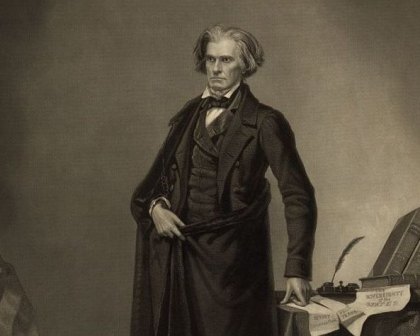Yale keeps Calhoun's name, drops 'master'

John C. Calhoun, vice president, was a proponent of slavery.
Engraving from a photo by Mathew Brady, Library of Congress.
By Yale tradition, residential college masters are faculty members who live in the college with their families, according to a school news release.
The use of master was a “legacy of the college system at Oxford and Cambridge. The term derives from the Latin magister, meaning ‘chief, head, director, teacher,’ and it appears in the titles of university degrees," the news release explained.
But “master” in the U.S. evokes slavery. Faculty members holding the position at the residential colleges agreed that they didn’t want to be addressed with that word.
Yale had also considered dropping the name Calhoun from one of its residential colleges. A Yale graduate, Calhoun was a representative and a senator from South Carolina and a vice president of the United States under John Quincy Adams and Andrew Jackson. He is remembered foremost as a proponent of slavery.
The university’s statement reasoned that taking Calhoun’s name off the building and renaming it “could have the effect of hiding the legacy of slavery.”
Instead, Yale scholars, staff and students will plunge into a historical study of Calhoun’s legacy, as well as “illuminate the lesser-known people, events, and narratives behind the familiar facades seen on campus. The study will enable students and scholars to understand not only those aspects of the university’s — and our nation’s — history that are a source of pride, but also those that are shameful and, therefore, essential to know and confront.”
Throughout the country, but particularly in the South, city and state officials have been debating whether to take down Confederate monuments and rename streets that honored Southern generals or politicians with segregationist views.
Earlier this month, Princeton University announced it would keep Woodrow Wilson's name on its public policy school. As president of Princeton, Wilson kept African-American students from enrolling.
In one of the most prominent changes, after the massacre of nine African-Americans attending a Bible study in Charleston, South Carolina, in June 2015, politicians took down the rebel flag in front of the Statehouse.
Related:
Princeton to keep Wilson's name on school
Georgetown confronts troubled history
Rebel flag may go, but guns stay
If you would like to comment, contact StudyHall.Rocks or like us on Facebook and tell us what you think.

